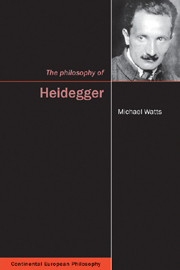Book contents
- Frontmatter
- Contents
- Preface
- Abbreviations
- 1 Heidegger's life
- 2 The meaning of life: the question of Being
- 3 The central ideas in Being and Time
- 4 Conscience, guilt and authenticity
- 5 Being-towards-death
- 6 Dasein's primordial temporality
- 7 The “truth of alētheia” and language
- 8 Heidegger on poetry, poets and Hölderlin
- 9 Heidegger on art
- 10 Heidegger on technology
- 11 Tao, Zen and Heidegger
- 12 Heidegger's politics
- Glossary
- Further reading
- Bibliography
- Index
11 - Tao, Zen and Heidegger
- Frontmatter
- Contents
- Preface
- Abbreviations
- 1 Heidegger's life
- 2 The meaning of life: the question of Being
- 3 The central ideas in Being and Time
- 4 Conscience, guilt and authenticity
- 5 Being-towards-death
- 6 Dasein's primordial temporality
- 7 The “truth of alētheia” and language
- 8 Heidegger on poetry, poets and Hölderlin
- 9 Heidegger on art
- 10 Heidegger on technology
- 11 Tao, Zen and Heidegger
- 12 Heidegger's politics
- Glossary
- Further reading
- Bibliography
- Index
Summary
Over the past two decades, a number of authors on Heidegger have recognized that his work has a certain affinity with East Asian thinking, notably with Taoism and Zen Buddhism, especially in his later thought. The fact that the Japanese have published seven translations of Being and Time, and that Heidegger is probably the most-studied modern philosopher in Asia, may well reflect this similarity between his own and East Asian thinking. On various occasions, Heidegger himself spoke of this connection. Otto Pöggeler, an eminent commentator on Heidegger's work, writes that Heidegger “gladly acknowledged to visitors the closeness of his thinking to the Taoist tradition and Zen Buddhism” (1987: 49). William Barrett related that when reading one of D. T. Suzuki's books on Buddhist thought, Heidegger said that Suzuki expressed what he himself had always tried to say (1956: xi).
The parallels between Heidegger and East Asian thinking are indisputable, which is why readers with a prior understanding of Asian philosophies will find themselves in familiar territory when they first encounter Heidegger's writings. What is not certain, however, is whether his thought was consciously influenced by East Asian philosophy, or whether the similarities are merely an example of what has been called “the universality of truth” expressing itself in a variety of ways.
Commentators on Heidegger's work who are sceptical about a direct East Asian influence on his thought emphasize his assertion that the modification of our technological approach to existence “cannot happen because of any takeover by Zen Buddhism or any other Eastern experience of the world … Thinking itself can only be transformed by a thinking which has the same origin and calling” (OGSU: 281).
- Type
- Chapter
- Information
- The Philosophy of Heidegger , pp. 230 - 244Publisher: Acumen PublishingPrint publication year: 2011

